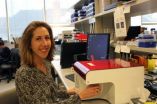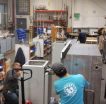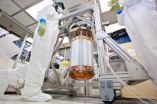(Press-News.org) New research from Queen Mary University of London has discovered 11 new DNA sequence variants in genes influencing high blood pressure and heart disease.
Identifying the new genes contributes to our growing understanding of the biology of blood pressure and, researchers believe, will eventually influence the development of new treatments. More immediately the study highlights opportunities to investigate the use of existing drugs for cardiovascular diseases.
The large international study, published today in the American Journal of Human Genetics, examined the DNA of 87,736 individuals to discover genetic variants associated with blood pressure traits. Validation of these sequence variants was performed in a further 68,368 individuals. This analysis led to the identification of 11 new genes.
Worldwide, raised blood pressure is estimated to cause 7.5 million deaths, about 12.8% of the total of all deaths*. Genes and lifestyle factors (e.g., salt intake and obesity) are both known to be important risk factors.
Patricia Munroe, Professor of Molecular Medicine at Queen Mary University of London, comments:
"Discovering these new genetic variants provides vital insight into how the body regulates blood pressure. With further research, we are hopeful it could lead to the development of new treatments for treating blood pressure and heart disease – a leading cause of death worldwide."
Michael Barnes, Director of Bioinformatics, Barts and The London NIHR Cardiovascular Biomedical Research Unit, Queen Mary University of London, comments:
"By highlighting several existing drugs that target proteins which influence blood pressure regulation, our study creates a very real opportunity to fast-track new therapies for hypertension into the clinic."
Researchers from Queen Mary collaborated on the research with scientists from the Center for Applied Genomics at The Children's Hospital of Philadelphia and the University Medical Center Utrecht, in the Netherlands.
INFORMATION:
For media information contact:
Charli Scouller
PR Manager (School of Medicine and Dentistry)
Queen Mary University of London
c.scouller@qmul.ac.uk
Tel: 020 7882 7943
Notes to the editor
The full paper is available upon request.
* http://www.who.int/gho/ncd/risk_factors/blood_pressure_prevalence_text/en/
We would like to thank the British Heart Foundation, Medical Research council and National Institute for Health Research, for their support in funding and facilitating this study.
About Queen Mary University of London
Queen Mary University of London is among the UK's leading research-intensive higher education institutions, with five campuses in the capital: Mile End, Whitechapel, Charterhouse Square, West Smithfield and Lincoln's Inn Fields.
A member of the Russell Group, Queen Mary is also one of the largest of the colleges of the University of London, with 17,800 students - 20 per cent of whom are from more than 150 countries.
Some 4,000 staff deliver world-class degrees and research across 21 departments, within three Faculties: Science and Engineering; Humanities and Social Sciences; and the School of Medicine and Dentistry.
Queen Mary has an annual turnover of £350m, research income worth £100m, and generates employment and output worth £700m to the UK economy each year.
Unique for London universities, Queen Mary has an integrated residential campus in Mile End - a 2,000-bed award-winning Student Village overlooking the scenic Regents Canal.
Scientists discover 11 new genes affecting blood pressure
2014-02-20
ELSE PRESS RELEASES FROM THIS DATE:
A changing view of bone marrow cells
2014-02-20
In the battle against infection, immune cells are the body's offense and defense—some cells go on the attack while others block invading pathogens. It has long been known that a population of blood stem cells that resides in the bone marrow generates all of these immune cells. But most scientists have believed that blood stem cells participate in battles against infection in a delayed way, replenishing immune cells on the front line only after they become depleted.
Now, using a novel microfluidic technique, researchers at Caltech have shown that these stem cells might ...
Compound improves cardiac function in mice with genetic heart defect, MU study finds
2014-02-20
COLUMBIA, Mo. — Congenital heart disease is the most common form of birth defect, affecting one out of every 125 babies, according to the National Institutes of Health. Researchers from the University of Missouri recently found success using a drug to treat laboratory mice with one form of congenital heart disease, hypertrophic cardiomyopathy — a weakening of the heart caused by abnormally thick muscle. By suppressing a faulty protein, the researchers reduced the thickness of the mice's heart muscles and improved their cardiac functioning.
Maike Krenz, M.D., has been ...
Turning back the clock on aging muscles?
2014-02-20
A study co-published in Nature Medicine this week by University of Toronto researcher Penney Gilbert has determined a stem cell based method for restoring strength to damaged skeletal muscles of the elderly.
Skeletal muscles are some of the most important muscles in the body, supporting functions such as sitting, standing, blinking and swallowing. In aging individuals, the function of these muscles significantly decreases.
"You lose fifteen percent of muscle mass every single year after the age of 75, a trend that is irreversible," cites Gilbert, Assistant Professor ...
Researchers say distant quasars could close a loophole in quantum mechanics
2014-02-20
In a paper published this week in the journal Physical Review Letters, MIT researchers propose an experiment that may close the last major loophole of Bell's inequality — a 50-year-old theorem that, if violated by experiments, would mean that our universe is based not on the textbook laws of classical physics, but on the less-tangible probabilities of quantum mechanics.
Such a quantum view would allow for seemingly counterintuitive phenomena such as entanglement, in which the measurement of one particle instantly affects another, even if those entangled particles are ...
Crop species may be more vulnerable to climate change than we thought
2014-02-20
A new study by a Wits University scientist has overturned a long-standing hypothesis about plant speciation (the formation of new and distinct species in the course of evolution), suggesting that agricultural crops could be more vulnerable to climate change than was previously thought.
Unlike humans and most other animals, plants can tolerate multiple copies of their genes – in fact some plants, called polyploids, can have more than 50 duplicates of their genomes in every cell. Scientists used to think that these extra genomes helped polyploids survive in new and extreme ...
Surprising culprit found in cell recycling defect
2014-02-20
To remain healthy, the body's cells must properly manage their waste recycling centers. Problems with these compartments, known as lysosomes, lead to a number of debilitating and sometimes lethal conditions.
Reporting in the Proceedings of the National Academy of Sciences (PNAS), researchers at Washington University School of Medicine in St. Louis have identified an unusual cause of the lysosomal storage disorder called mucolipidosis III, at least in a subset of patients. This rare disorder causes skeletal and heart abnormalities and can result in a shortened lifespan. ...
MD Anderson researcher uncovers some of the ancient mysteries of leprosy
2014-02-20
Research at The University of Texas MD Anderson Cancer Center is finally unearthing some of the ancient mysteries behind leprosy, also known as Hansen's disease, which has plagued mankind throughout history. The new research findings appear in the current edition of journal PLOS Neglected Tropical Diseases. According to this new hypothesis, the disease might be the oldest human-specific infection, with roots that likely stem back millions of years.
There are hundreds of thousands of new cases of leprosy worldwide each year, but the disease is rare in the United States, ...
Sustainable manufacturing system to better consider the human component
2014-02-20
CORVALLIS, Ore. – Engineers at Oregon State University have developed a new approach toward "sustainable manufacturing" that begins on the factory floor and tries to encompass the totality of manufacturing issues – including economic, environmental, and social impacts.
This approach, they say, builds on previous approaches that considered various facets of sustainability in a more individual manner. Past methods often worked backward from a finished product and rarely incorporated the complexity of human social concerns.
The findings have been published in the Journal ...
New calibration confirms LUX dark matter results
2014-02-20
PROVIDENCE, R.I. [Brown University] — A new high-accuracy calibration of the LUX (Large Underground Xenon) dark matter detector demonstrates the experiment's sensitivity to ultra-low energy events. The new analysis strongly confirms the result that low-mass dark matter particles were a no-show during the detector's initial run, which concluded last summer.
The first dark matter search results from LUX detector were announced last October. The detector proved to be exquisitely sensitive, but found no evidence of the dark matter particles during its first 90-day run, ruling ...
Better broccoli, enhanced anti-cancer benefits with longer shelf life
2014-02-20
URBANA, Ill. – While researching methods to increase the already well-recognized anti-cancer properties of broccoli, researchers at the University of Illinois also found a way to prolong the vegetable's shelf life.
And, according to the recently published study, the method is a natural and inexpensive way to produce broccoli that has even more health benefits and won't spoil so quickly on your refrigerator shelf.
Jack Juvik, a U of I crop sciences researcher, explained that the combined application of two compounds, both are natural products extracted from plants, increased ...





